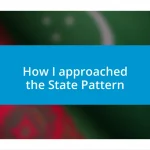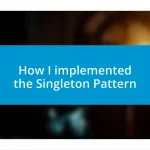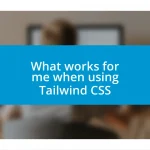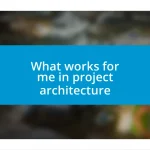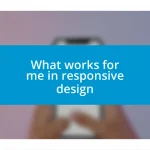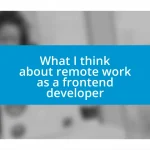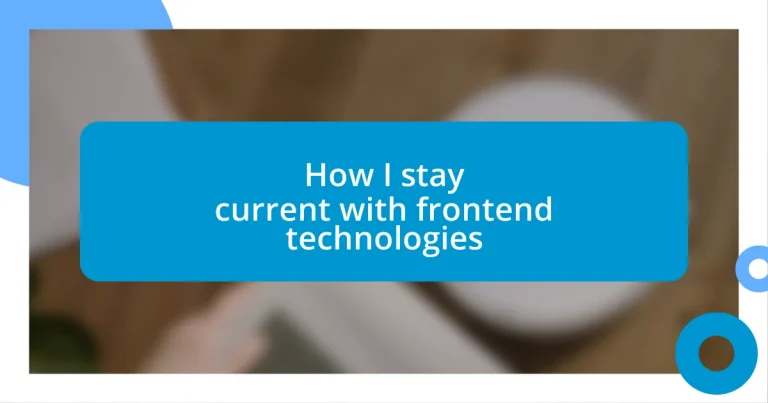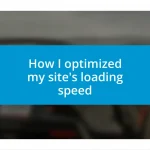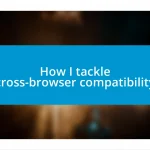Key takeaways:
- Engaging with developer communities and networking fosters collaboration, encourages learning, and provides support in overcoming challenges.
- Following industry influencers and utilizing online learning platforms enhances understanding of frontend technologies through diverse insights and hands-on experiences.
- Practicing with real projects and maintaining a curated resource list aids in skill development, problem-solving, and sharing knowledge within the developer community.
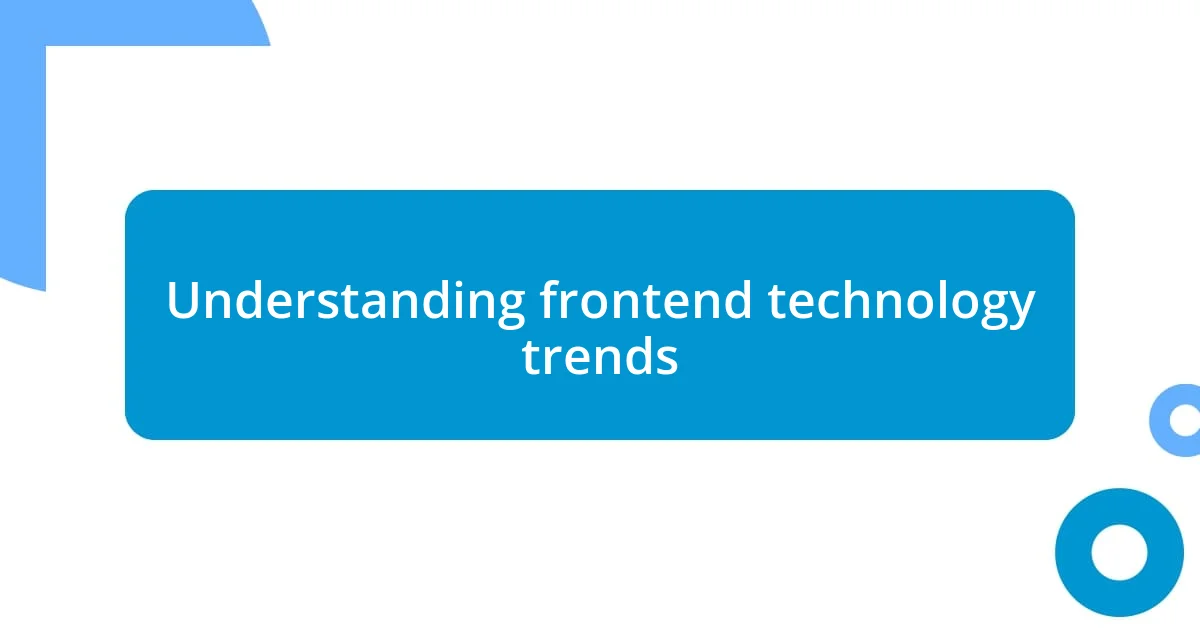
Understanding frontend technology trends
When I think about understanding frontend technology trends, it often feels like standing on shifting sand. Just when I think I have a grasp on one trend, a new one emerges, like the rapid rise of frameworks such as React and Vue. I remember the first time I tried to learn a new library and felt that initial jolt of confusion—has that ever happened to you?
Delving into these trends can be exhilarating yet overwhelming. For instance, the transition to JAMstack has completely altered how I approach web development. I find myself questioning my methods frequently: How can I optimize performance while ensuring a seamless user experience? Reflecting on these questions pushes me to dig deeper and embrace continuous learning.
Staying attuned to trends involves more than just reading articles. Engaging with communities on platforms like Twitter or Discord has been incredibly beneficial for me. I’ve had countless enlightening exchanges where developers share insights that push my understanding to new heights. Doesn’t it feel refreshing to realize you’re not alone in this fast-paced journey?
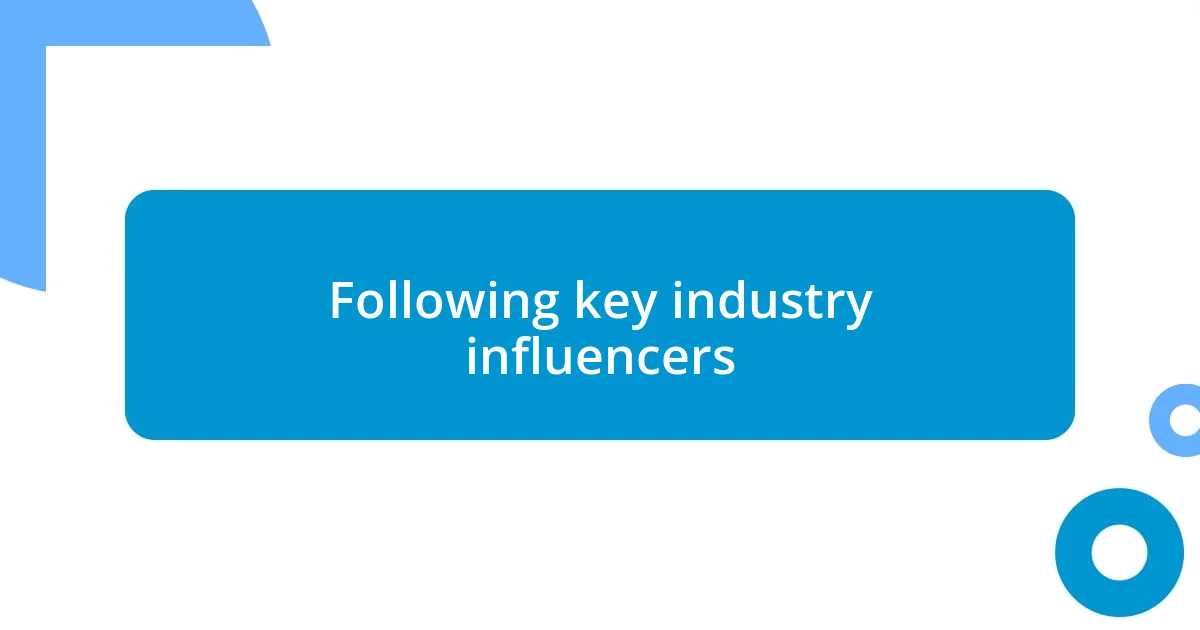
Following key industry influencers
Following key industry influencers can significantly shape my understanding of frontend technologies. I remember when I first started to follow a couple of developers on Twitter; their insights and thoughts were like little nuggets of gold. They shared not only what tools were popular but also offered deeper reflections on why certain technologies matter. Engaging with their content makes me feel as if I’m part of a larger conversation, rather than just an observer.
Here are some influencers I regularly turn to for guidance:
- Dan Abramov (co-author of Redux) – His Twitter threads often demystify complex concepts.
- Ryan Florence (co-founder of React Router) – He shares practical tips that I’ve found invaluable for routing in web apps.
- Addy Osmani (Google Chrome engineer) – His insights on performance enhancements and tooling are always eye-opening.
- Sarah Drasner (involved in Vue and SVG animations) – Her work on animations has inspired me to push creative boundaries in my projects.
By following these voices, I not only keep up with the latest trends but also gain insights that resonate on a personal level. It’s exciting to learn how their experiences reflect the challenges and victories many of us face in the tech world.
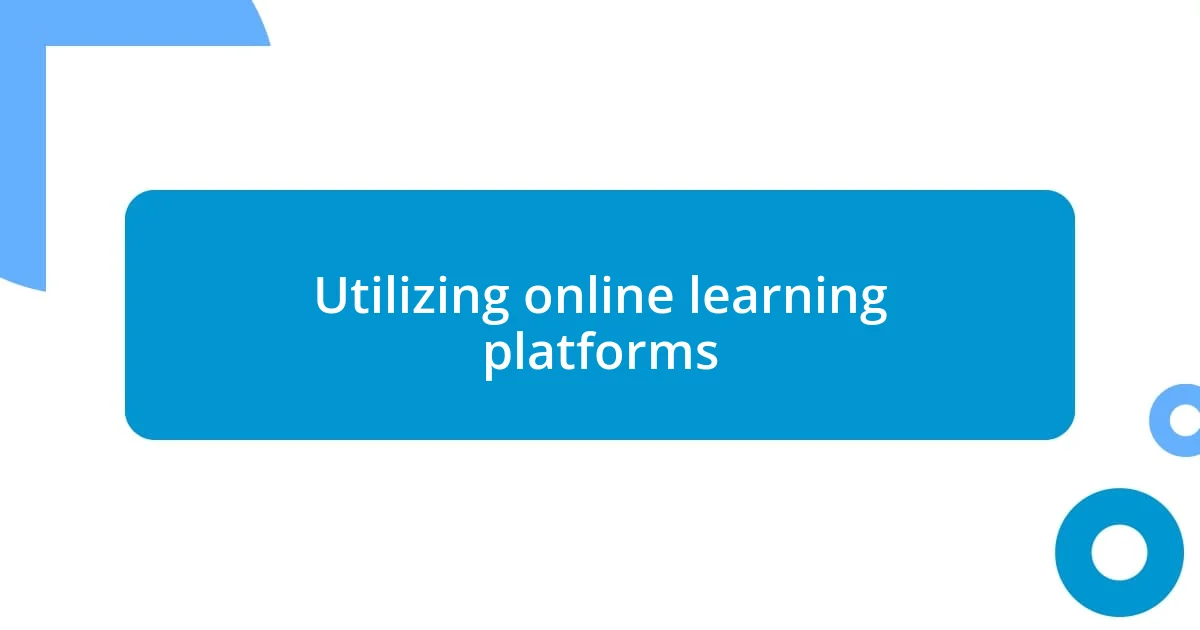
Utilizing online learning platforms
Utilizing online learning platforms has transformed how I engage with frontend technologies. I often find myself diving into courses that not only offer theoretical knowledge but also hands-on projects. I recall the thrill of completing an intensive React course on a popular platform—my first project was a simple to-do list app, but the rush of seeing my code come to life was unforgettable. Have you ever felt that moment when you realize you can create something functional just from what you’ve learned? It’s purely exhilarating!
In my experience, platforms like Udemy, Coursera, and Codecademy each have distinct strengths. While Udemy offers a treasure trove of specific topics, I appreciate how Coursera collaborates with universities to provide in-depth courses. On the other hand, Codecademy’s interactive environment helps me grasp concepts quickly. Do you prefer structured courses or hands-on learning? For me, finding the balance between the two is crucial for effective learning.
I’ve also begun to appreciate the community aspect of these platforms. Engaging with fellow learners through discussion forums has opened new avenues for collaboration. When someone posts a thoughtful question, it’s illuminating; often, their curiosity sparks a deeper understanding for me as well. It’s like being part of a study group, where the exchange of ideas becomes as valuable as the course content itself.
| Platform | Strengths |
|---|---|
| Udemy | Diverse topics, often project-based |
| Coursera | University-level courses, in-depth insights |
| Codecademy | Interactive learning, quick feedback |
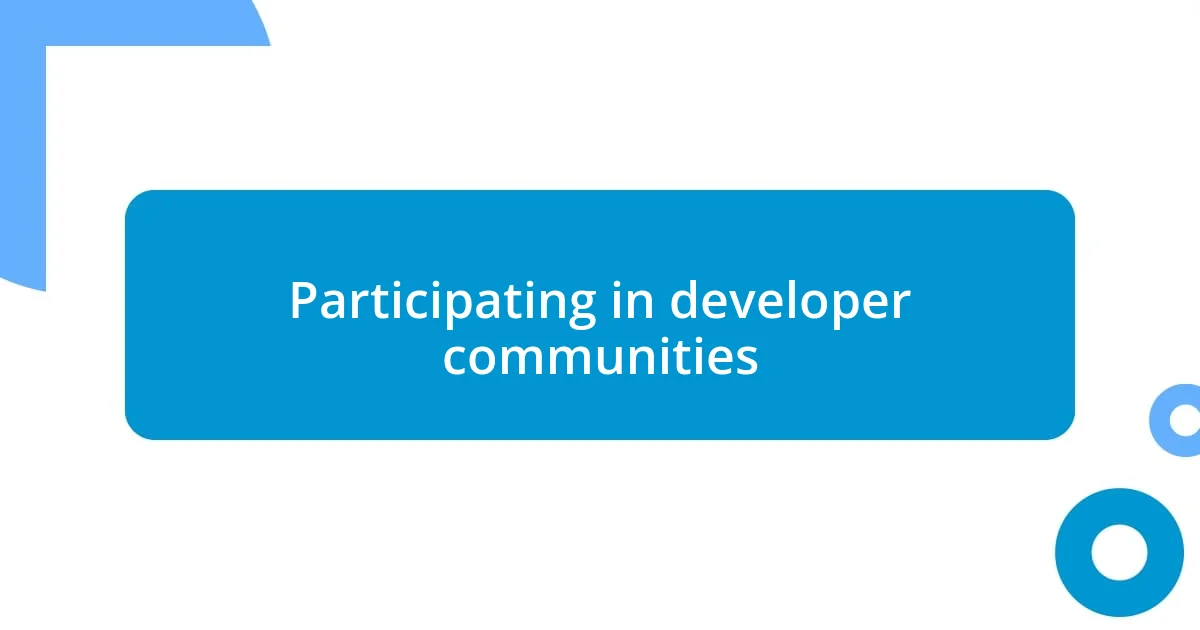
Participating in developer communities
Participating in developer communities has been a game changer for me. One evening, I decided to join a local meetup focused on modern JavaScript frameworks. The energy in the room was palpable, and as I shared my thoughts on a recent project, I found unexpected encouragement from others who understood the challenges I faced. It’s fascinating how stepping into a room full of like-minded individuals can instantly validate your experiences and spark new ideas. Have you ever had that moment where a simple conversation ignites a fresh perspective?
I’ve also dove into various online forums and chat groups, like Discord and Reddit, which have opened the doors to countless discussions and resources. Just the other day, I stumbled upon a thread about performance optimization in React applications. I shared my own struggles and received immediate feedback from experienced developers. It’s incredible how these platforms create a space for knowledge-sharing, fostering a sense of camaraderie among professionals at all levels. I can’t help but wonder—how often do we overlook the collective wisdom within our own communities?
Moreover, I’ve participated in hackathons that really pushed my skills to the limit. The thrill of collaborating with others under tight deadlines has taught me more than any tutorial ever could. I remember one particular event where we had to build a mini-app in just 48 hours. The rush of brainstorming ideas, coding together, and finally presenting our project was exhilarating. It left me with lasting friendships and a wealth of knowledge that I continue to draw upon. How can you not feel inspired when you witness what a motivated group can achieve together?
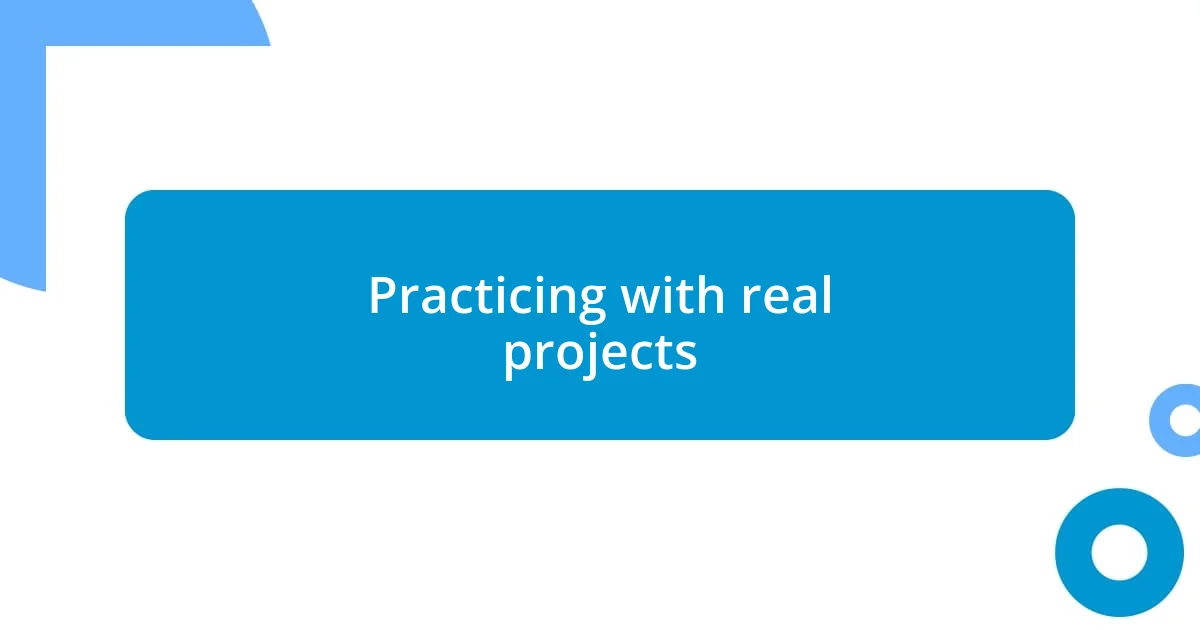
Practicing with real projects
Practicing with real projects is where the magic happens for me. I remember the first time I decided to take a weekend and build a personal portfolio site. It wasn’t just about design; it was about translating my ideas into something tangible. As I clicked “publish,” I felt a rush of pride and ownership over my work. Have you ever taken a leap of faith like that, turning a concept into a fully realized project? It’s an unforgettable thrill.
I’ve found that real projects push me beyond my comfort zone. Once, I collaborated with a friend to create a small e-commerce site. The experience taught me more than any course could. We tackled everything from API integration to payment processing, and though we faced many late-night coding sessions filled with coffee-fueled frustration, the joy of seeing our site go live was worth every moment. What obstacles have you faced in your own projects, and how did you overcome them? Those challenges are often the best teachers.
I often volunteer my skills for local community initiatives, too, which has opened my eyes to the real-world impact of frontend development. Recently, I helped design a website for a non-profit, and witnessing their gratitude made it all feel worthwhile. Seeing how my work improved their outreach gave me a sense of purpose that is hard to replicate in solo endeavors. It’s amazing how practical projects can not only help me grow technically but also fulfill a deeper need to contribute. How does your work connect to your personal values?
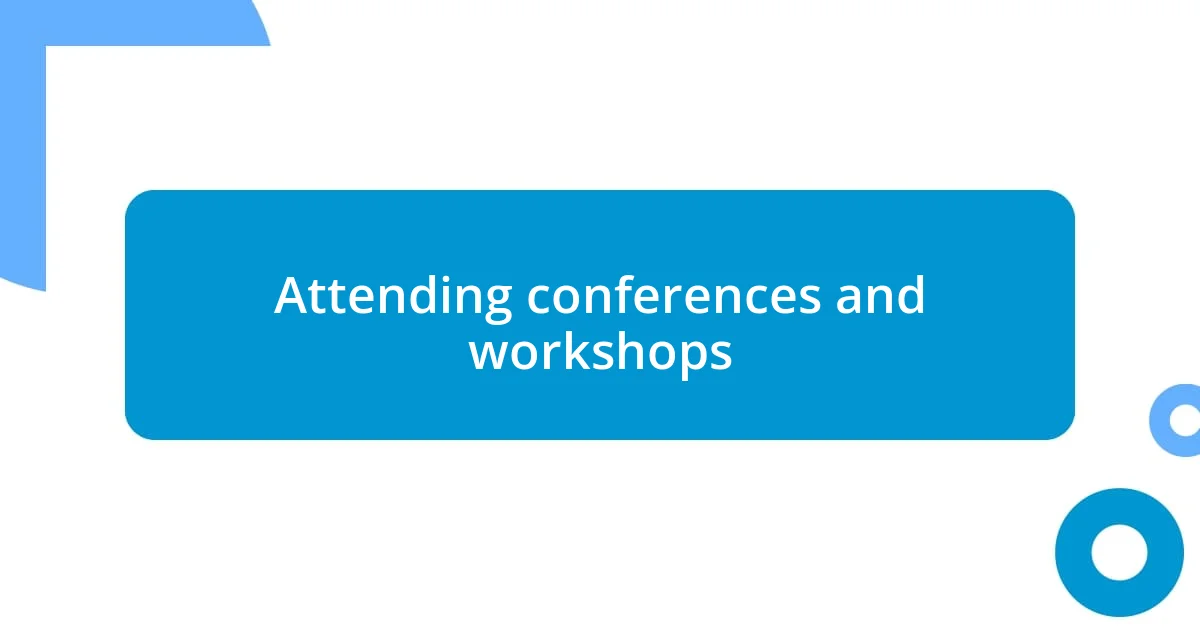
Attending conferences and workshops
Attending conferences and workshops has always been a highlight of my professional journey. I distinctly remember my first large-scale web development conference. The buzz of excitement was contagious, and every session I attended left me with new insights and practical tips. Listening to industry leaders share their experiences felt like sitting at the feet of giants, and I often found myself jotting down notes furiously. Have you ever felt that adrenaline rush when you learn something that you know will change the way you work?
Participating in hands-on workshops has also been particularly rewarding. I once attended a half-day session focused on CSS Grid, which was an area I had little experience in. By the end of that workshop, I had created a layout I was truly proud of, and the sense of achievement was incredible. That moment reinforced my belief in the value of immersive learning. How often do you allow yourself to dive deep into a topic to unlock your potential?
Networking at these events is another key benefit that I’ve experienced firsthand. There’s something magical about sharing a coffee with someone who’s tackling similar challenges. One time, I connected with a developer from a different city, and we ended up collaborating on an open-source project together. The relationships I’ve built through conferences have not only enhanced my skills but have also led to friendships that I cherish. Isn’t it fascinating how a simple conversation can expand our horizons in unexpected ways?
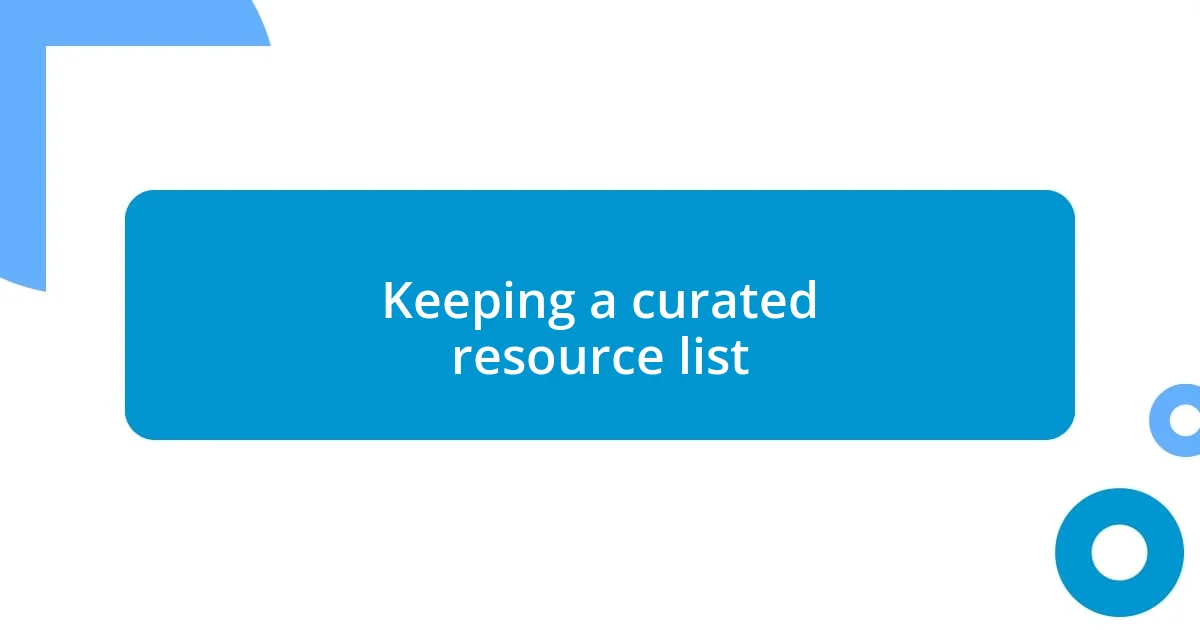
Keeping a curated resource list
Keeping a curated resource list has been an essential strategy in my development toolkit. I recall the first time I decided to compile all my favorite articles and tutorials into one document. It seemed tedious at first, but looking back, it transformed my learning. Now, whenever I face a challenge, I can quickly refer to my collection, saving time and sparking new ideas. Have you ever realized how much easier problem-solving becomes when you have a reliable go-to guide?
Maintaining this list isn’t just about gathering links; it’s about reflection and organization. Each time I read a new post or watch a webinar, I take notes on what resonates with me. I actually have a section dedicated to ‘key takeaways’ that reminds me why certain resources stood out in the first place. It’s like having a personal mentor at my fingertips, guiding me through concepts when I need a refresher. Who wouldn’t want that kind of support as they navigate the complexities of frontend development?
I also make an effort to share my curated list with fellow developers. Just last month, I sent my resource list to a group of colleagues who were new to React. Their excitement reminded me of how much we can learn from each other. We even ended up discussing our favorite resources over coffee, which not only deepened our knowledge but fostered a sense of community. Isn’t it rewarding to think that your small effort might help someone else on their journey?
